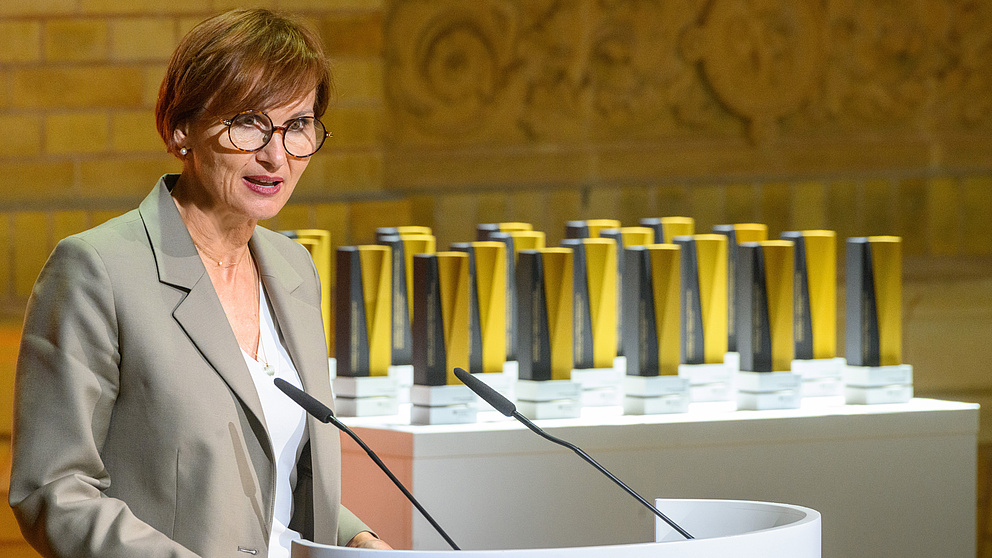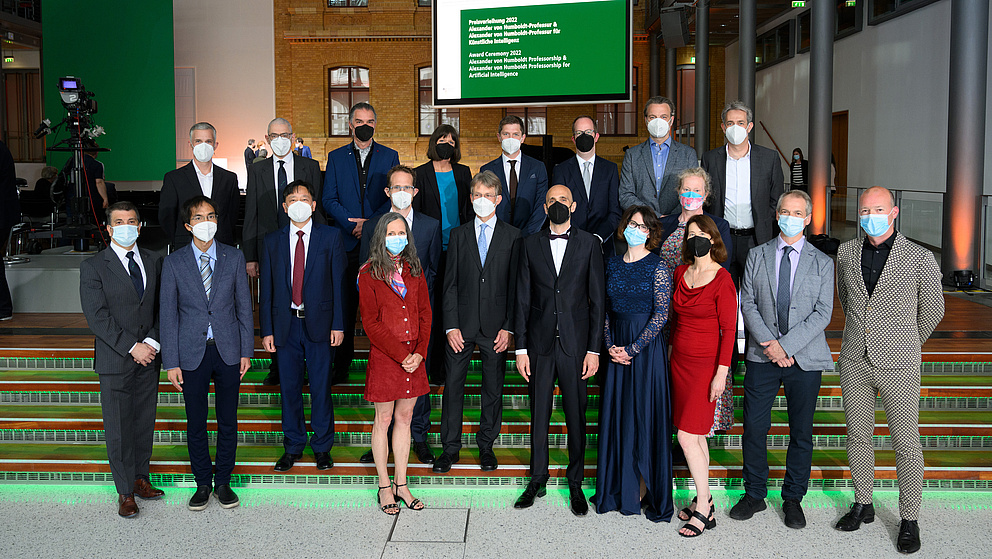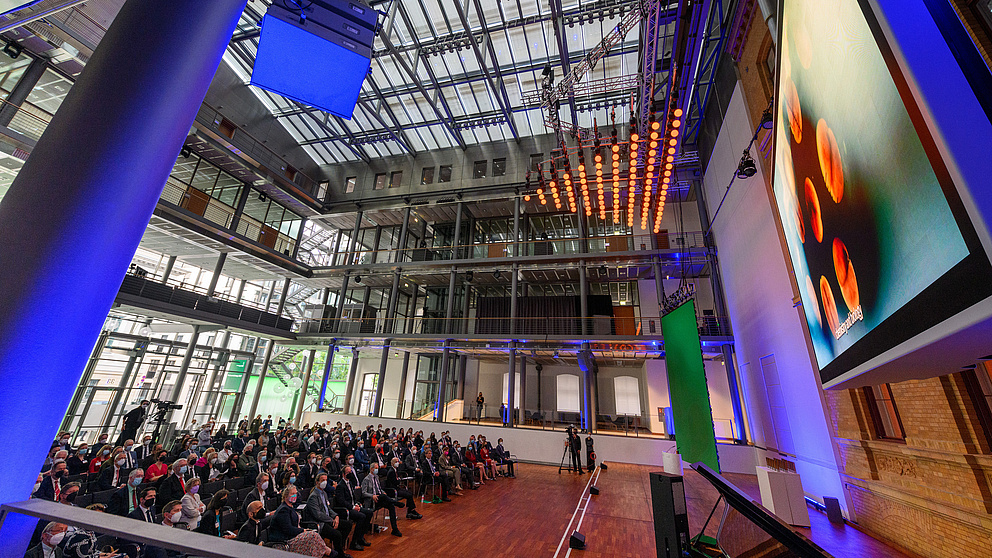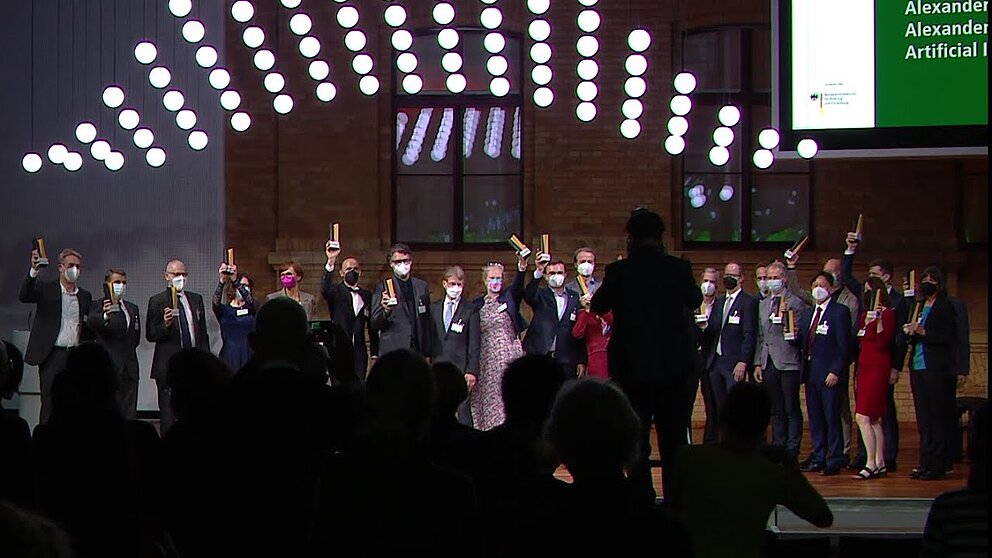
Contact
Press, Communications and Marketing
Tel.: +49 228 833-144
Fax: +49 228 833-441
presse[at]avh.de
Twenty-one top researchers were the focus of an award ceremony held on Thursday evening in Berlin, where they were presented Germany’s most valuable research award, the Alexander von Humboldt Professorship. During the festive event, Federal Minister of Education and Research Bettina Stark-Watzinger and Hans-Christian Pape, President of the Alexander von Humboldt Foundation, presented the awards which come with up to €5 million in funding.
The five women and 16 men chosen to receive an Alexander von Humboldt Professorship come from seven countries and will be moving to universities in 15 cities in Germany where they will conduct research over a longer period as a Humboldt Professor. The award ceremony also honoured Humboldt Professors for Artificial Intelligence (AI) for the first time. This programme line is part of the German government’s national AI Strategy. It targets leading international researchers whose work revolves around the exploration and uses of AI and its effects on society.
“We need science and its worldwide collaboration in order to find solutions to the existential crises of our age and to make life more sustainable”, said Hans-Christian Pape, President of the Humboldt Foundation. Humboldt Professorships make this possible in the area of cutting-edge research. “With these professorships, Germany is investing not only in science – it is also investing in all our futures.” At the same time, he stressed how important a wide range of perspectives is for research: “The dynamics behind science benefit from the diversity of its protagonists”, said Pape and called for scrutinising academic structures to see whether talented individuals and top researchers find the best possible conditions for their work there.
Federal Minister of Education and Research Bettina Stark-Watzinger noted: “We are recognising internationally leading researchers with the Alexander von Humboldt Professorship, the most valuable international research award in Germany. These individuals combine excellence and internationality. With this award we are strengthening research in Germany and are ensuring our ability to compete internationally. At the same time, we are expanding our technological sovereignty, which is of crucial importance in connection with, for example, artificial intelligence since we want to be a global player in this area. Our researchers and the experts in industry are particularly important for accomplishing this.” Stark-Watzinger continued, “I am therefore particularly pleased that we are also able to award the first Alexander von Humboldt Professorships for Artificial Intelligence this year. The recipients are among the best in this field worldwide. With these awards, we also want to further increase the number of AI professorships beyond the 100 that have been additionally created.”
The Humboldt Foundation awards up to ten Alexander von Humboldt Professorships every year to eminent researchers of all disciplines who have been working abroad to date. Alexander von Humboldt Professorships each come with €5 million in funding for individuals conducting experimental research and €3.5 million for researchers working in theoretical fields. In addition to the candidates’ outstanding scientific and academic qualifications, a deciding factor in the selection process are the concepts developed by the universities that will offer the researchers and their teams long-term career prospects in Germany. Alexander von Humboldt Professorships are financed by Germany’s Federal Ministry of Education and Research.
Alexander von Humboldt Professorships are being awarded to:
- Catherina Becker, Neurobiology (Technische Universität Dresden, previously: University of Edinburgh, UK)
- Andrea Bréard, Sinology/Mathematics (Friedrich-Alexander-Universität Erlangen-Nürnberg (FAU), previously: Université Paris-Saclay, FRA)
- Kristian Franze, Physical Biology (Friedrich-Alexander-Universität Erlangen-Nürnberg (FAU), previously: University of Cambridge, UK)
- Christian Frezza, Metabolic Physiology (University of Cologne, previously: University of Cambridge, UK)
- Stefan G. Hofmann, Translational Clinical Psychology (University of Marburg, previously: Boston University, USA)
- Gustav Holzegel, Mathematics (University of Münster, previously: Imperial College London, UK)
- Jan Huisken, Medical Engineering (University of Göttingen, previously: University of Wisconsin-Madison, USA)
- Markus Klute, Elementary Particle Physics (Karlsruhe Institute of Technology (KIT), previously: Massachusetts Institute of Technology (MIT), USA)
- Francisco Moreno-Fernández, Linguistics (Heidelberg University, previously: Harvard University, USA)
- Kou Murayama, Psychology (University of Tübingen, previously: University of Reading, UK)
- Kate Rigby, Environmental Humanities (University of Cologne, previously: Bath Spa University, UK)
- Joacim Rocklöv, Epidemiology and Public Health (Heidelberg University, previously: Umeå University, SWE)
- Bart Thomma, Microbiology (University of Cologne, previously: Wageningen University, NL)
- Thorsten Wagener, Hydrology (University of Potsdam, previously: University of Bristol, UK)
Alexander von Humboldt Professorships for Artificial Intelligence are being awarded to:
- Peter Dayan, Theoretical Neuroscience, AI (University of Tübingen and Max Planck Institute for Biological Cybernetics, previously: University College London, UK)
- Holger Hoos, Machine Learning (RWTH Aachen University, previously: Leiden University, NL)
- Yaochu Jin, AI, Image and Language Processing (Bielefeld University, previously: University of Surrey, UK)
- Daniel Rückert, Computer Science, AI (Technical University of Munich (TUM), previously: Imperial College London, UK)
- Angela Schoellig, Robotics and AI (Technical University of Munich (TUM), previously: University of Toronto, CAN)
- Radu Timofte, Computer Vision, AI (University of Würzburg, previously: ETH Zurich, CH)
- Aimee van Wynsberghe, Ethics of AI (University of Bonn, previously: TU Delft, NL)
The Hochschule für Musik und Theater Hamburg (University for Music and Theatre Hamburg) organised the dramaturgical side of the evening. Four musical-visual segments showed relationships between art and artificial intelligence.
(Press release 15/2022)
Every year, the Alexander von Humboldt Foundation enables more than 2,000 researchers from all over the world to spend time conducting research in Germany. The Foundation maintains an interdisciplinary network of well over 30,000 Humboldtians in more than 140 countries around the world – including 63 Nobel Prize winners.






